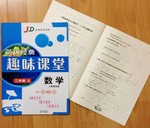题目内容
19.Many people complain that their memory is bad,particularly as they get older.Life would be so much easier if we could remember things (51)A.So how can we improve our memory?Many people think that repeating things is the best way to remember.While this undoubtedly helps short-term memory (remembering a telephone number for a few seconds,(52)D,psychologists doubt whether it can help you to remember things for long.The British psychologist E.C.Stanford seemed to (53)Bthis point when he tested himself on five prayers that he had read aloud every morning for over 25 years.He found that he could remember no more than three words of them!(54)A,especially for remembering numbers,is‘chunking'(分块),or grouping the information.The following numbers would be (55)Bfor most of us to remember.1492178919931848.But look at them in‘chunks',and it becomes much easier.1492 1789 1993 1848.
So what about‘memory training'?We've all (56)Cpeople who can memorise packs of card by heart---how is this done and can anyone learn how to do it?(57)Cexperts,there are various ways of training your memory.Many of them (58)Dforming a mental picture of the items to be memorised.One method,which may be useful in learning foreign languages,is to create a picture in your mind (59)Da word you want to remember.Another method is to invent a story that includes all the things you want to remember.People were asked to remember up to 120 words using this technique; when tested afterwards,on average,they were able to (60)A90 per cent of them!Surprisingly,however,there is nothing (61)Dabout these methods---they were around even in ancient times.Apparently the Roman general Publius Scipio could (62)Bhis entire army---35,000 men in total!
(63)B,not all of us are interested in learning long lists of names and numbers just for fun.For those studying large quantities of information,psychologists suggest that the best way to‘form (64)Cconnections'is to ask yourself lots of questions as you go along.So,for example,if you were reading about a particular disease,you would ask yourself questions like:‘Do people get it from water?',‘What parts of the body does it affect?'and so on.This is said to be far more effective than time spent‘(65)A'reading and re-reading notes.
| 51.A.effortlessly | B.purposefully | C.exactly | D.carelessly |
| 52.A.by contrast | B.in that case | C.in no way | D.for example |
| 53.A.raise | B.prove | C.discuss | D.stress |
| 54.A.More helpful | B.Much worse | C.More difficult | D.Much shorter |
| 55.A.convenient | B.impossible | C.meaningful | D.technical |
| 56.A.agreed with | B.learned from | C.heard about | D.apologized for |
| 57.A.Due to | B.In case of | C.According to | D.In spite of |
| 58.A.exclude | B.mean | C.suggest | D.involve |
| 59.A.isolated from | B.sensitive to | C.responsible for | D.associated with |
| 60.A.recall | B.recite | C.revise | D.restore |
| 61.A.effective | B.awful | C.valuable | D.new |
| 62.A.train | B.recognize | C.lead | D.command |
| 63.A.Furthermore | B.However | C.Summarily | D.Therefore |
| 64.A.unknown | B.loose | C.meaningful | D.personal |
| 65.A.passively | B.silently | C.amusingly | D.extensively. |
分析 本文属于科普知识类的短文阅读.主要介绍了人们的记忆力随着年龄的增加日益衰退,那么如何提高人的记忆力呢,本文就这一话题进行了探讨.要重复记忆,分块记忆,寻找规律,将要记忆的内容编成故事,结合自己的实际提出有针对性的问题等等.
解答 51-55 A D B A B 56-60 C C D D A 61-65 D B B C A
51.A.考查副词的词义辨析和语境理解.由开头一句Many people complain that their memory is bad可知,人们抱怨自己的记忆力变差,所以可推知如果能够不费力的记忆该有多好,effortlessly不费力的;故选A.
52.D.考查介词的词义辨析和语境理解.While this undoubtedly helps short-term memory 说明重复有助于短时记忆,后面的记忆电话号码就是一个例子;by contrast对比;in that case在那种情况下;in no way绝不;for example例如;故选D.
53.B.考查动词的词义辨析和语境理解.前面一句psychologists doubt whether it can help you to remember things for long说有的心理学家怀疑这是否有助于长久的记忆事务,那么接下来英国心理学家E.C.Stanford就来证明这个结论;prove证明.故选B.
54.A.考查形容词的词义辨析和语境理解.He found that he could remember no more than three words of them!他发现自己记住了不超过三个词汇,后面的especially表示递进,所以说明他的结论是站得住脚的;和More helpful构成进一步的关系;故选A.
55.B.考查形容词的词义辨析和语境理解.由于下面的数字没有任何规律,所以我们大部分人记住几乎是不可能的;故选B.
56.C.考查动词的词义辨析和语境理解.根据后面宾语从句的内容people who can memorise packs of card by heart可知,应该是听说过用心记忆成包的卡片的人的故事;故选C.
57.C.考查介词的词义辨析和语境理解.主句there are various ways of training your memory强调,有许多训练人的记忆力的方法,所以前面应该是一种理论依据,所以用according to experts,根据专家的观点;故选C.
58.D.考查动词的词义辨析和语境理解.此处强调许多方法都包含要把记忆的内容在大脑中形成一个图画;involve doing sth包含做某事.故选D.
59.D.考查动词的词义辨析和语境理解.这是介绍的一种方法,即把create a picture in your mind和a word you want to remember两者结合起来;所以用be associated with把什么和什么联系起来;故选D.
60.A.考查动词的词义辨析和语境理解.通过把要记忆的内容变成一个故事,平均每个人都能够回忆起90%的内容;故选A.
61.D.考查形容词的词义辨析和语境理解.根据后面的解释they were around even in ancient times可知,这在古代就有这种记忆方法,所以并不新鲜;故选D.
62.B.考查名词的词义辨析和语境理解.这里是举例古代记忆方法的例子,罗马将军Publius Scipio能够记住自己3500多名士兵;故选B.
63.B.考查副词的词义辨析和语境理解.not all of us are interested in learning long lists of names and numbers just for fun这句与前面的内容相反,即表示转折,所以选B.
64.C.考查形容词的词义辨析和语境理解.对于大量的信息要组建有意义的联系,才能更好的记住他们;故选C.
65.A.考查副词的词义辨析和语境理解.这是针对前面的to ask yourself lots of questions as you go along进行的举例说明,积极的设想比被动的阅读大量信息要有效的多,故选A.
点评 完型填空,解题时要抓住文章的脉络,一定要读懂全文,弄清文章要表达的思想,注意前后段落之间的关系.答题中,一定要认真分析,注意选项与上下文的关系,与前后单词的关系.对于一时没有太大的把握的题可以放到最后再来完成,因为有时答案可以从下文内容体现出来.答完后再通读一篇文章,看看所选选项能不能是语句通顺,语意连贯.

 黄冈经典趣味课堂系列答案
黄冈经典趣味课堂系列答案 启东小题作业本系列答案
启东小题作业本系列答案